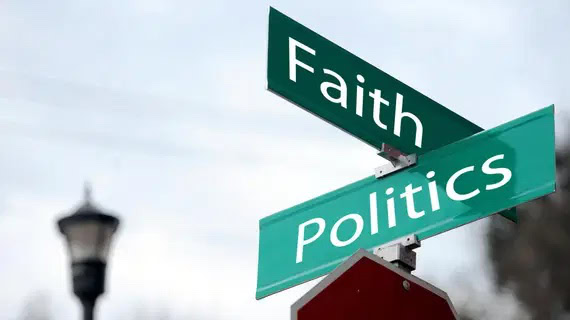By Chuck Donovan
The Washington Stand
This is a four-part series on the strength of the Republican state platforms on core values. Follow these links to part 1 (life), part 2 (marriage), and part 3 (parental rights and education) and see how your state stacks up in the corresponding grids.
Over the past couple of months, this column has carefully reviewed state Republican platforms for their contents on the key issues of the sanctity of human life, the definition of marriage, and education choice. The impetus for this analysis was the sharp shift last July from a national GOP platform that had featured detailed commitments on social policies to the truncated 2024 national platform that was framed in terms of 20 major concepts with few details. What follows is the final analysis in this series, as we take a look at the contents of the state platforms on matters of faith — an area where the 2024 election featured crude accusations from leading liberals that Republicans favor some form of theocracy or Christian nationalism.
As is so often the case in elections, the truth is very different. One begins with the difficulty of defining what is meant by theocracy and Christian nationalism in a nation that, like most of Western civilization, has a heritage of laws based on moral precepts nurtured by an overwhelmingly Christian heritage and populace. Today’s battles over the display of the Ten Commandments in public school classrooms are a reflection of growing disagreements about the continuing relevance of the code that inspired most U.S. lawmaking for centuries. That lawmaking was a natural outgrowth of the American Founders’ own faith and their proclamation, in the Declaration of Independence, that the true rights of every American flow not from government but from our Creator.
This understanding of the American project was once so naturally accepted that marble portraits on the walls of the chamber of the U.S. House of Representatives have, at their center, an image of Moses, the Lawgiver. This pride of place for the messenger of the Ten Commandments among 22 other lawgivers from various religious and cultural traditions was not controversial when it was installed after World War II.
Therein lies, as the late Paul Harvey would say, “the rest of the story.” Moses and the Ten Commandments are central, the figure toward whom all the others literally turn their gaze, and there are many more portraits on those walls that highlight the Judeo-Christian tradition. But the images capture other lawgivers as well — Suleiman, Hammurabi, and Lycurgus, for example — who exemplify other strands in the fabric of world history. All in all, these portraits capture what had been a settled view: America is a nation that was born out of Judeo-Christian principles of such breadth and confidence that its authors could create a nation of religious freedom, limited government, and ordered liberty.
As this analysis finds, the 2024 (and earlier in a few cases, where states did not update their texts) GOP state platforms honored this understanding of our religious heritage and the role of faith in public life. The Democrats’ caricature of those views is just that, combined with an attempt to gain an advantage on particular questions of public policy — like abortion, sexual behavior, and gender — where religious teachings play a profound but not exclusive role in what constitutes good law or an accurate rendering of human nature.
For Republicans, this attitude by now might be deemed second nature. On the eve of the Civil War, the fledgling GOP platform declared: “That the maintenance of the principles promulgated in the Declaration of Independence and embodied in the Federal Constitution, ‘That all men are created equal; that they are endowed by their Creator with certain inalienable rights; that among these are life, liberty and the pursuit of happiness; that to secure these rights, governments are instituted among men, deriving their just powers from the consent of the governed,’ is essential to the preservation of our Republican institutions; and that the Federal Constitution, the Rights of the States, and the Union of the States must and shall be preserved.”
This is the primary sentiment, expressed in diverse ways in the GOP platforms reviewed for this article. The language “promulgated in the Declaration … and embodied in the Constitution” is found in 41 of the 50 state platforms, and in the remainder there is either no state-specific platform or only a link or homage to the national GOP platform approved in Milwaukee in July. It’s safe to say that none of the platforms diminish — much less contradict — this assertion. Most repeat it in some manner in order to assert the basis for the platform’s endorsement of specific public policies, such as private property rights, marriage and family, economic liberty, and the right to life. When the English writer G. K. Chesterton spoke of the United States as “a nation with the soul of a church” this kind of understanding informed his view.
Second only to the sweeping approval of the idea of God as the Author of our freedoms is the platforms’ embrace of religious liberty and the corollary concept of freedom of conscience. Some platforms delve into particular questions such as objections to government mandates on religious providers to offer contraception or carry out abortions. Again, with the caveat that roughly 20% of the states offer no platform of their own, 37 state platforms pay tribute to religious liberty for all Americans. North Carolina’s language is particularly eloquent:
“We support the free exercise of religion by all Americans. We oppose any restriction on the free exercise of religion such as removing prayer from governmental activities or name of God or similar terms from our public documents and institutions. We oppose any attempt of government to establish a state religion, or to foster one religion over another. We oppose any governmental coercive action aimed at limiting the free exercise of religion. We support the right of individuals and corporations to uphold their free exercise rights consistent with the First Amendment to the United States Constitution. We support the right of all institutions, including hospitals and schools, to refuse to provide contraceptive, abortion, or other services and procedures inconsistent with their religious tenets.”
No wonder that political actors desire statements like these to be transmuted into some notion of theocratic tyranny. Indeed, policy debates continue on questions like legal protection for the unborn, gun control, social justice, gender identity, and closure of churches during pandemics, but the merits of each have not been determined by appeals solely to religious texts or revelation.
Drilling down further into the platform texts reveals, in fact, that most are focused on principle and not conclusory on certain topics related to religion in the public square. Only six of the platforms refer specifically to the Ten Commandments, the Bible is referenced six times, as is Christianity (apart from our Judeo-Christian heritage which is mentioned nearly a dozen times as part of a call for renewed attention in schools to our founding documents, the Pledge of Allegiance, and the “laws of nature and of nature’s God”).
In short, the platforms are profoundly faith-driven, especially about the origin and inalienable nature of rights and natural institutions, but decidedly non-sectarian. Even prayer in schools, and in other public contexts where it has occasionally become controversial, is mentioned in just less than a third of the platforms. Here, as our previous analyses have shown, there appears to be more emphasis on school choice and repeal in several states of Blaine Amendments that may stand in the way of including religious options in choice programs.
Overall, the Republican state platforms of 2024 tend to illustrate the depth of the GOP’s policy commitments on the dominant social issue concerns of our day. The platforms trace their roots to the American founding and show their devotion to ordered liberty, limited government, and natural institutions — in short, to faith, family, and freedom.
















